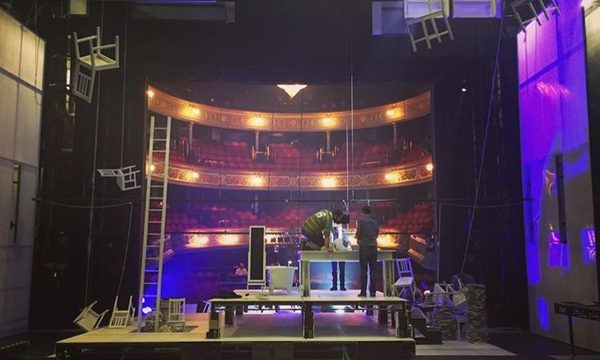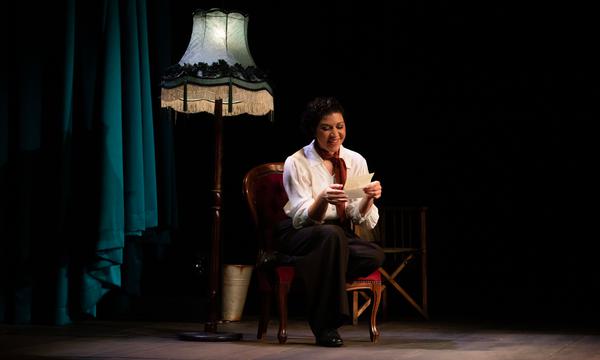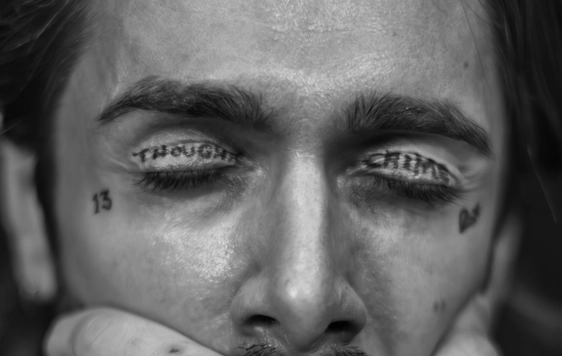News Story
The run of Macbeth (an undoing) is under way and after one performance, Kerrie, from our Creative Learning team sat down with the wonderful Zinnie Harris, The Lyceum's associate artistic director but also of course the writer and director of Macbeth (an undoing), to give our audience a bit of an insight into this adaptation and also some of the things to look out for while you're watching. So, without further ado...
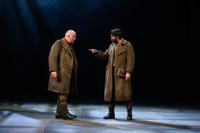
Zinnie, I wondered if you could start by telling us about your experience of Shakespeare at school, were his texts something you enjoyed?
I have to say I didn't go beyond Nat Five with English. I went down a different route and studied biology at university and then came back to drama and literature later. I studied Macbeth, as a lot of people have done for the Nat five, however, I don't remember being taken to see it. I think that sometimes, it can become that we study Shakespeare on the page, and we don't see it on the stage. My feeling about Shakespeare is that it must be experienced in three dimensions, with actors telling us a story, in real time, because that's the way he wrote it and intended it. The danger is that it becomes quite literary, analysing this sentence here or this sentence there, rather than experiencing his brilliant plotting and characterisation as the story unfolds.
I think at the core of every Shakespeare play it's what it is to be human, how do we wrestle with all these different kinds of emotions and ambitions and still keep our humanity. I think that's what he was obsessed with, and particularly with Macbeth we see that.
What was it about the Macbeth text that made you choose to adapt it? Why that play in particular?
I think it follows on from several pieces of work for me over the last decade or longer. I've been working with a series of plays that are in the in the canon of dramatic works where there is a central woman's role. A role for a woman that has been written by a man that I feel maybe has either been underwritten or has been a bit misunderstood. My intention is to reframe that with a slightly more contemporary understanding of women, of motivation, maybe even a bit more sympathetically.
With that in mind, I have worked with Strindberg's Miss Julie and Ibsen’s A Doll's House. I rewrote the Oresteia looking at the character of Clytemnestra who's seen as a very bad woman, but actually, I felt maybe she had a bit more justification for killing her husband, not that there's ever any justification for murder, but you know what I mean. Then more recently at the Lyceum, I did a version of Websters The Duchess of Malfi.
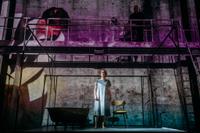
I have had Lady Macbeth in my sights for a while, and one of the reasons for this is because Lady Macbeth herself - we understand to be this iconic figure that we all know. I think she's even got an entry in the dictionary because we understand what somebody being ‘Lady-Macbeth-like' means. In the first half of Shakespeare's original text, she is this very capable, strong, powerful, ambitious, woman who, with her husband, conspires to murder the king, and in the second half of the play, almost really without any kind of signposting, she disappears on us. She becomes really absent, and she has this very famous sleepwalking scene where it seems to me that her psyche is starting to dysregulate and dismantle, then within a scene she kills herself. So, I've always been curious about what she is iconic for? Is she iconic for the monstrous murderous woman or do we hold her up as one of the most famous literary figures because of her downfall?
Does this reveal something about how we see women? If we see women being murderous or ambitious, we also need to chart their downfall because it's uncomfortable for us that women behave in this way? But also, what I see in the original text, is that there's just a huge hole in the narrative. She seems on this trajectory, she's becoming strong and then seemingly with explanation, she disappears on us.
Think about it - Macbeth gets the prophecy that he will become Cawdor, which comes true straight away, and that he will become king, and he says “oh hang on a minute does that does that mean I'm going to do something bad” and then she picks up on this and replied “I think you've got it in you to be king but you haven't got the right nature”. She knows she’s going to have to get alongside him do it together.
Again, in the original Shakespeare and in my version, Macbeth slightly faffs about saying "is this a dagger I see before me?”. In the original he's almost on the brink of doing something but really doubting whether he can step forward and do anything that drastic. He then does it but mucks it up as he brings the daggers back and Lady Macbeth says, “oh good grief that was the one thing you were supposed to do, you were supposed to leave the daggers there so it would look like the stewards that killed him” and she ends up taking them back. All the way through the dinner with the king while they are both conspiring to murder, she's alongside him sorting out how they will do it. Then when Macbeth starts to see Banquo's ghost in the original, she pulls him aside and says for “for goodness' sake get a grip you're looking guilty we're going to look guilty”, so her trajectory is the strong one, and he is starting to fragment, and then in the original Shakespeare, the next time we see her she's almost entirely fragmented and is sleepwalking.
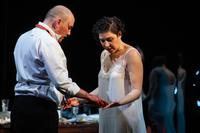
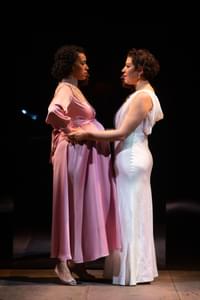
It makes no sense. So, my question if you like became ‘what on earth happened to this this strong woman’? Through conversations with people who are much more expert on Shakespeare than I am, they've said there's at least one school of thought that there is a missing section of Macbeth. There are couple of places in Macbeth where there might have been more material that that got cut, or we have an incomplete version, so that gave me license to think about what would happen if I filled in that gap, so that I really tell the story of how we get from this strong woman who is definitely sorting it out, to somebody who is fragmenting. That's the first thing I wanted to do.
But then when I started to really think about a feminist revision, which is essentially what I'm doing, there were two other female parts that I thought were underrepresented. One was the character of Lady Macduff, who in the original, we meet at the moment of her murder, the moment of her destruction. I think we connect, of course, as writers and theatre makers, to a larger conversation. I'm very plugged into a conversation about the portrayal of women, and I think as a contemporary audience we're not that comfortable with meeting a woman just at the moment of her destruction. When we see murder mysteries on television or wherever, we don't like it when we just see women as victims, we want to know who they are and what was lost when someone dies. I wanted to give Lady Macduff a journey, and a presence, and a story right through. So, in my version, she has a close relationship with Lady Macbeth.
Then the other was about the witches. We don't live in a world, or certainly in this country, where witches have any currency, but we do live in a world where there may be points in women's lives or particular things that people might say that almost disempower women sometimes. We are still marginalizing women in many ways, and so I wanted to breathe life into the witches, to not have them as these supernatural figures, but think about their reality. What if they were a family and they had a story with Lady Macbeth so that we can see them as real people.
What did you consider when you were adapting and reimagining this text and for a contemporary audience?
I think one of the things when you're doing an adaptation is you have to be really clear that you're bringing something, adding to the original, and not just simply putting it into your own words. Shakespeare's language is utterly exquisite, and every moment of it is like poetry, so I didn't want to just do Shakespeare in my own words. However, because of everything I wanted to do with the play, I knew I'd have to write new material.
So, I had a problem. I had Shakespeare's text, that there was nothing wrong with. Certainly, the first half anyway, and in my version the first half is broadly faithful, and there's probably about 60% of it is Shakespeare and 40% is mine. Then, the second half I completely flip, and the new story takes off. So, I knew I'd have to be writing new material and I knew I'd have bits of Shakespeare within that.
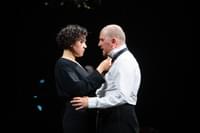
I wrote an early draft where I utilised the techniques I used when adapting Webster’s The Duchess of Malfi. My solution then, was to slightly drop the heightened poetry of Webster and raise my own so they could meet in the middle. I tried to do that with Shakespeare but because he's writing in this highly structured formal iambic pentameter, I couldn’t just drop it because it's so well known, it just didn’t sound right. I also felt that I couldn't raise mine high enough, so I had to find a form so that the two could crash into each other.
There are two solutions to this problem, one is by using the supernatural, it allows me to almost glitch into a more contemporary vernacular if you like. We have the scene with Lady Macbeth and Macbeth and Lady Macbeth has just had the letter from Macbeth that tells her he's got the prophecy, he comes back from war, he's victorious, he's quite pumped up, he comes in he says kiss me. This scene is mainly Shakespeare's language, but I wanted to add a little bit at the end, so I created this moment where Lady Macbeth says; “you've got a ladybird on your arm” and he goes to brush it off but she stops him and says, “no it's good luck”, he replies with !a ladybird in summer?”. This moment works because I’ve already peppered in the notion of luck, and the witches which allowed me to turn the scene into a more contemporary one, we see these two iconic characters, known for blood and murder, get a bit more domestic.
The other way I wanted to do it was to be really clear that I'm putting on a play and that the players in the play are putting on a play. The very first moment of the play is an actor coming onto the stage and saying, ‘knock knock knock’. She talks about us playmaking, she talks about the fact that we are making a play, that you in the audience will have seen it before and that you've come for blood. In a sense I've got the original Shakespeare and I've got the contemporary play and they're in dialogue with each other. You'll have seen that right through the play we always keep coming back to that idea. The witches and Lady Macbeth are increasingly aware that they're in a play, and Lady Macbeth in particular is aware that the play is trying to drive her back into the old Shakespearean version where she kills herself as she sleepwalks. We see that she is trying to drive the play in a different direction because she doesn't believe that that is her journey. There's a sense in which there's a knowingness about the fact that we're putting on a play which also allowed a kind of theatricality.
The male characters and Lady Macduff don't understand that they are in a play and they're just playing their own roles. Through this, I'm trying to show my workings, that I'm unpacking the Shakespearian language and trying to add to it but use the fact that we're making a piece of theatre. I think that's what's maybe interesting about it as well, this is of course what Shakespeare does. We have the play within a play in Hamlet, we have the mechanicals in A Midsummer Night's Dream putting on a play, he also has a lot of direct address and moments where a character will step out and address the audience, as well as the soliloquies, it felt like my writing was still Shakespearean in form even though it's contemporary in how it’s written.
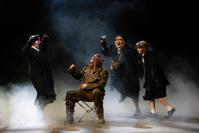
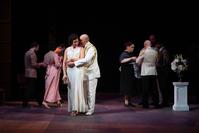
How did you modify the relationship between Macbeth and Lady Macbeth in this reimagining? In this story she has more agency so how did that influence their relationship?
In a way I'm not sure I can answer it without saying the biggest spoiler ever, but their relationship is very changed. Lady Macbeth is the strong one right the way through and it is Macbeth who is struggling with his internal life. I just followed that idea through to its logical conclusion, until finally the play comes back at Lady Macbeth and re-straight jackets her.
I also think what’s interesting to me is that Macbeth in the original is ultimately a portrait of a marriage. They do become King and Queen, but of course they are also a man and a woman living domestically. One of the great mysteries about Lady Macbeth is about whether or not she's ever had any children. We hear the line “I've given suck and I know how tender it is to love the babe that milks me”, so we know she has at least had a child, but there is no mention of their children in the play. When Macbeth learns that not only is he going to be king but his mate Banquo is going to give rise to a line of kings, he chooses not to tell his wife that, he chooses to keep out the bit to do with children, which suggests to me that children was a big issue and a big topic in their marriage and maybe a source of sadness. I've leant into the story of their fertility and their sadness, as well as their ambition and their hopes as the story goes forward.
Lady Macduff in my production is pregnant too, so that makes it even more painful for Lady Macbeth. I have hypothesized that they've lost children or that that pregnancies have gone wrong, and Lady Macduff is pregnant so that's another complication and pressure on Lady Macbeth throughout the play.
You said you are leaning into female characters and making them stronger and more present but why now have you decided to do that for your contemporary audience?
Why now? I think we are on a journey as a society of understanding where we've been, how we've seen things in the past, how we've almost overlooked some stories and I think we're interested in different stories and more diverse stories. I think that reimagining older texts by putting the women centre stage is part of that, and that's very much what I'm interested in. Particularly, as I said, characters who I feel are very well known, but also slightly underwritten or that have a hole in their story.
When I wrote The Duchess [of Malfi], I felt it connected to the me-too movement because that's very much about the confusion of power and control over women. For this play, I think it connects to how women are portrayed, and how much agency they're given within stories. Exploring whose viewpoint we are seeing this story through, and I suppose that's the main thing I've done, I've changed the viewpoint of the play from Macbeth’s to Lady Macbeth's. It feels like it's a valid thing to do and that it’s chiming with the time.
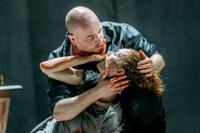
I think it's also where I am on my journey to tackle the big one who was certainly Lady Macbeth. I'm not quite sure what I will do next. I think it's such a well-known play in its original form that there's quite an interest, and an appetite, for a different version of it. I think we're so lucky with what we're given with Shakespeare, he writes these incredibly rich plays, but because they're there and they exist and they will always exist, we're also able to reinterpret them. I feel that they still have so much to say to us, but we can triangulate with the times and bring them into the contemporary world by slightly changing the view.
I think lots of people are doing that with different Shakespeare plays in lots of ways. I suppose it also connects to a conversation about how many women we have in central roles on the stage, and one of the ways that people respond to that is to make Hamlet female. In a way I've tried to do something different here, which is not just change all the genders and bring people in, but rather see what happens if we just look at the female story and we set the lens so that we see it from her viewpoint.
How involved are you with the whole direction of the play and working with the cast?
So, the first draft of the play was written in August and then I was redrafting through the autumn and at the same time casting the show. Alongside that, I was working very closely with the designers. We've got Tom Piper, who designed the set, who I've worked with before, and Alex Davis, our costume designer. We were going backwards and forwards with designs, lots of different drawings which kept changing and evolving.
I think once I’ve finished writing the play then there's a second process, if you are a director as well, which is exploring the form of the production. Once the play broadly works (there might be things that are still changing through workshops) you start to discover what the play itself is going to feel like. Macbeth (an undoing) doesn’t have a time setting but I chose the feel of the 30s, this is because in the 30s there was this rise in fascism across Europe, but I also wanted to have the sense that it feels recent enough for a contemporary sensibility and still allows an opulence and a regal feeling.
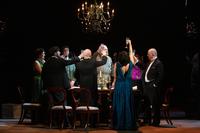
Then we went into rehearsals, I had a couple of days with Nicole and Adam, who played Macbeth and Lady Macbeth, pre-Christmas. We then went into rehearsals from the 4 January for 4 weeks of rehearsals, which is quick for a play of this size. Then I had tech week, previews and then you're on. I think whilst it's achievable the thing that's difficult about it is that it's coming at you so fast that it's only really towards the end of the previews that you start to understand what it is we've made. There's no time for reflection unless you have a chance to revisit it, but that that's very much the process.
What was it like creating your idea, when you were directing, was it easy to know what you wanted it to look like as you wrote it?
You'd think that having written it, I would know exactly what I wanted to do and exactly what it should look like but oddly it doesn't work like that. I've directed quite a few of my plays and firstly what I think you've got to be really clear about with the acting company is that just because you wrote it doesn't mean you know everything. I like to make sure the company understands that I believe that we are, as a group of people, going to work out how to bring this to the stage.
Secondly, I really don't know everything. I remember when I did The Scent of Roses last year there was a moment where one of the actors thought that a speech wasn't right for their character, I looked at it and agreed, and then about three weeks later I realised the text was actually right and put it back in. It's interesting that the play has an understanding of itself and a logic that myself as a director and the company are almost catching up on. There's an internal working that you must really pay attention to, and if I'm not careful I can lose it in favour of making a moment work quickly, I have got to really trust the text and try to hear what it's saying even though I'm excavating like the rest of the group.
So, it's certainly not the case that I already know what it's going to look like in my head and what I'm trying to achieve. I think it's more about asking how I can solve this theatrical moment and how can I work as a team to try and find the solution. I love having a democratic, open rehearsal room, where people throw in ideas. I really like it if you're working with two or three people on a scene, but you've got a company of 10 in the space, I like them to be in and around adding to the work, so I feel like a company that's making work rather than just me.
